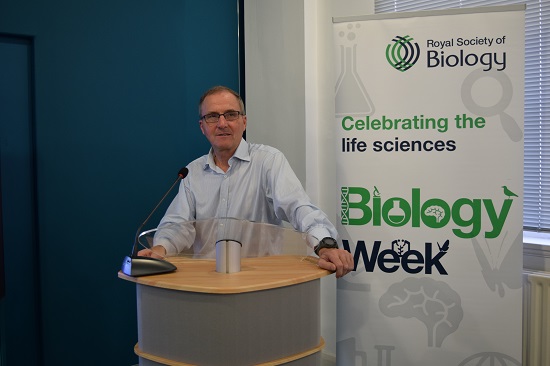News
RSB’s MO Twilight Meeting concludes there is a need for learned societies to unite
- Details
- 06 October 2022
Yesterday, this event gave representatives from Royal Society of Biology Member Organisations the opportunity to hear a keynote address from the new RSB President, Professor Sir Ian Boyd FRSB, entitled The Evolving Role of Learned Societies.
Sir Ian was chief scientific adviser at Defra from September 2012 to August 2019, and is a professor of biology at the University of St Andrews. He is chair of the UK Research Integrity Office.
Hosted by Professor Patricia Kuwabara FRSB, chair of the RSB’s College of Organisational Members, the event was part of our MO Twilight Meeting series.
Starting off his keynote, Sir Ian began by talking about the definition of learned societies: “We are groups of like-minded people with common interests agreeing to get together to share and promote our own interests. In some sense, learned societies are nothing more than the collection of individuals who make them up.
“In terms of science, they are a societal construct to promote the field of science and one of the questions we need to ask is how much do we promote the science internally within memberships and how much do we promote it externally to the wider world?”
Sir Ian discussed where learned societies fit within the wider context of our own rapidly changing society. In particular, he noted that the social media revolution is transforming our network dynamic and the ways we receive information. Sir Ian commented: “Learned societies can now create networks of people with common interests almost instantly using social media. There’s a question about whether the original role of learned societies has actually been sustained through time.”
He then dissected the purpose of learned societies in present day, saying: “In the modern sense, we address some of the bigger challenges we have, such as global issues like food security. In my previous job in Government, food security was always there as a big issue, even if government didn’t understand it, I made it absolutely clear that I thought we had a huge vulnerability in terms of our food supply – science was performing a role.”
Reflecting on the new Prime Minister’s speech, Sir Ian made the point: “There is the challenge of economic growth and activity, the PM’s speech is all about ‘growth, growth, growth.’ But actually unfettered growth is a real problem, if we keep on driving our economies in the classical way we do, then all we do is drive consumption.
“We will not get climate change under control if we do not get consumption under control. So when the PM talks about ‘growth’, I think, ‘well what kind of growth are you talking about?’ and if we want to do that, we will have to change the values of society.”
Sir Ian then went on to say: “We need to make sure that we give the right messages about how science can actually improve people’s lives and improve health and welfare. It’s also important for us to aid the translation of these scientific messages to the public.”
Ending his keynote, Sir Ian made some closing remarks about increasing our ED&I efforts and the need for learned societies to come together to provide a united, coordinated voice to influence policy in government, which spurred on an interesting Q&A from organisational members.
A video of the meeting are available for all organisational members of the RSB. Contact events@rsb.org.uk


